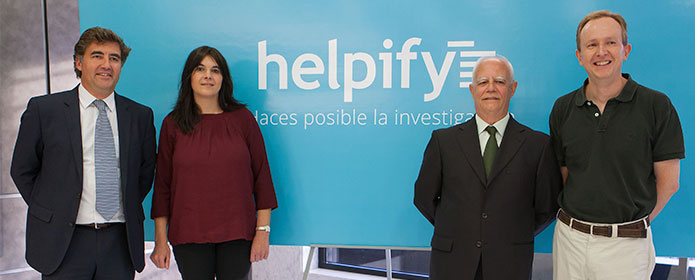"Gene therapy to treat rare diseases is now a reality."
Dr. Cristian Smerdou, researcher of CIMA of the University of Navarra, said during the presentation of Helpify, a platform to promote the research of these pathologies.

Adriana is a girl from Noáin who is 6 years old and has Dravet syndrome, a rare disease Genetics that causes generalized seizures of prolonged duration and lacks effective treatment. And she is the protagonist of the first story of Helpify, a platform promoted by the research center Applied Medicine (CIMA) of the University of Navarra, which was presented yesterday in Pamplona. Its objectives are to promote the research gene therapy for rare diseases and to seek funding to start new programs of study to achieve a cure for these patients. This initiative is carried out in partnership with the Spanish Federation of Rare Diseases (FEDER), an organization that represents more than 3 million affected Spaniards (7% of the Spanish population).
One out of every one hundred children is born each year with a monogenic disease, a pathology caused by mutations or alterations in a single gene. According to Dr. Cristian Smerdou, researcher of the Gene Therapy and Regulation of Gene Expression Program at CIMA, "the introduction into the organism of correct copies of the damaged gene could be an effective treatment for these children. To achieve this, we need to identify the most suitable vehicle or vector and test it in the laboratory, a phase prior to clinical trials that is essential to ensure the efficacy and safety of the treatment."
The CIMA is a center of reference letter in Spain in the preclinical treatment of rare diseases through the application of gene therapy. In 2013 it initiated the first clinical essay in the world of gene therapy to treat acute intermittent porphyria, a disease that causes severe alterations of the nervous system. In addition, they have recently developed a therapeutic vector that reverses the symptoms of Wilson's disease in animal models, a pathology Genetics that causes severe liver and nervous system damage. "The results obtained so far suggest that gene therapy could be successfully applied in other monogenic diseases such as Dravet syndrome. To promote this project we need the whole of society, both companies and individuals, to get involved and support this initiative. Together we can offer a solution to thousands of patients and their families," said Dr. Smerdou.
In this line, José María Casado, delegate of FEDER in Navarra, explained that "it is estimated that rare diseases take average 5 years to be diagnosed. We hope that gene therapy and genetic diagnosis will help to bring to light many diseases that are currently unknown and to achieve a treatment. Our hope is research, even if it takes time. Because if we don't start walking we will never reach the end of the road".
Gene therapy against Dravet syndromeDravet syndrome is a disease Genetics diagnosed between 4 and 12 months of age. At older ages it is associated with cognitive delay and severe behavioral disturbances. "Adriana had her first seizure at 4 months. Since then, not only has she never complained about what is happening to her, but she transmits her strength to all of us who are with her. How can we not be strong if she is the strongest," explains Ainhoa Pariente, Adriana's mother.
"At present, there is no effective treatment, but it is a disease that could be cured by gene therapy, so we cannot give up. We have to fight. And the only path we have is research. There are very few of us, 7% of the Spanish population, and many grains of sand make a mountain. We can reach the cima. We have to be able to change the future of these children," says Ainhoa.
